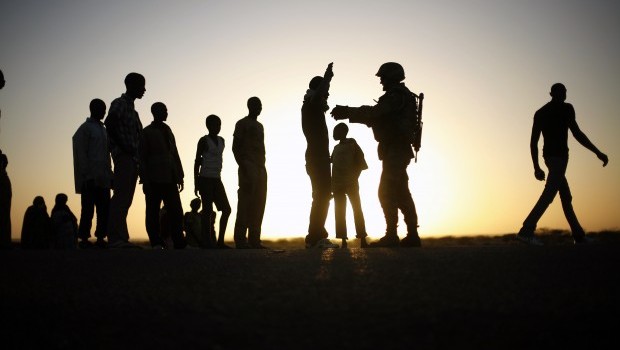
A French soldier checks passengers of a transport truck arriving in Gao, northern Mali, Thursday Feb. 14, 2013. Malian forces have stepped up security around the port an the main market, in an effort to stop the infiltration of rebel fighters in the town. (AP Photo/Jerome Delay)
According to its President, Francois Hollande: “France, at the request of the President of Mali, and respecting the United Nations’ charter, committed itself yesterday to support the Malian army against terrorist aggression that threatens all of West Africa”. Yet the question here is what is this rule that applies to Mali but does not apply to al-Assad’s crimes against the Syrians? If the President of Mali requested France alone to mobilize, with Western blessing, then what is to stop someone saying that that Iran, for example, could intervene to protect al-Assad at the request of the “Syrian President”, who has constantly claimed that the rebels are terrorists?
This is truly a distressing matter. My intention here is not to detract from the plight of Mali and its citizens, or to belittle their sufferings, but the story here lies in ignoring the suffering of the Syrians; a plight that cannot be sanctioned by any logic, law or religion. It is strange that Francois Hollande says that the intervention operation in Mali will last “as long as necessary”, and that “France will always be there when the rights of a people, those of Mali who want to live freely and in a democracy, are at issue”. The question here is: Is this not also the demand of the Syrians who have been confronting the worst kinds of terrorism carried out by the al-Assad regime, amidst an international silence, for the past two years? When I talk about an international silence here, I do not mean the Syrians need words, rather they need action. It is inconceivable for the Syrian rebels to be left without support in the face of a criminal regime that does not hesitate to use aircraft and missiles, with clear Iranian backing, whilst the West rushes to save Mali.
For the sake of argument, some may point to the difficult international political scene with regards to Syria, and argue that external intervention would only complicate matters. However, the reality in front of us says that diplomatic efforts, whether at the level of talks with the Russians or through the Security Council, are not serious. We cannot say that everyone has done all they can. The world, including our region, has sat waiting in a vacuum created by the US President and his electoral priorities over the past two years, and everyone is still waiting for a decisive US stance. Meanwhile, al-Assad is not waiting for anything; his crimes against the Syrians are ongoing and he is even coming out proposing initiatives on his terms.
To conclude, the justification provided by the French for their military intervention in Mali is nothing but a condemnation of France itself, along with the international community, for failing to intervene and support the rebels in Syria, who are suffering crimes more heinous than what is happening in Mali. Al-Assad does not only represent a threat to the Syrians, but also to the region as a whole and the Mediterranean, which of course impacts upon the security of France and the West.
